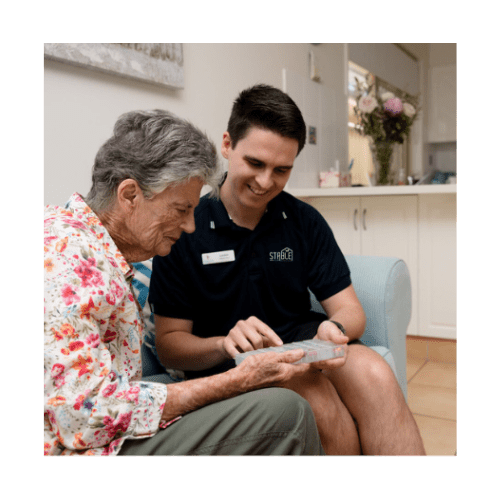The Expanding Demand for In Home Treatment Givers: Factors Families Select Professional Treatment Over Conventional Facilities
The enhancing preference for in-home caregivers over typical centers is a significant trend improving the landscape of older care. Households are drawn to the benefits of individualized care that aligns with individual demands and preferences, permitting elders to maintain a feeling of freedom in an acquainted environment.
Customization of Treatment
Personalization of care in home caregiving is vital for satisfying the distinct demands of each individual (ndis support coordinator). This approach makes sure that care plans are customized to the certain requirements of the person, considering their clinical history, individual choices, and way of life. By focusing on the person's unique circumstances, caretakers can foster a sense of dignity and autonomy, which is typically doing not have in even more institutionalized setups

Home caregiving allows for continuous observation and adjustment of care methods, guaranteeing that adjustments in wellness standing or individual preferences are quickly dealt with. Eventually, personalized treatment in home settings significantly contributes to the general well-being of customers, making it a vital component of modern-day caregiving practices.
Convenience of Home Atmosphere
The comfort of a home atmosphere plays an important function in the efficiency of home caregiving. Numerous individuals, particularly seniors, experience heightened stress and anxiousness when put in strange setups such as typical care centers. Home caregiving supplies an acquainted environment, loaded with personal possessions, valued memories, and the sense of safety that comes from being in one's own area. This experience can considerably enhance psychological wellness, which is important for recuperation and general health and wellness.
Furthermore, the home environment enables a tailored method to caregiving, suiting specific choices and routines. Households can create an environment that mirrors their loved one's way of living, making sure that treatment is provided in a manner that feels comfy and all-natural. This customized setting motivates much better interaction and interaction between caretakers and clients, promoting trust and connection vital for effective treatment.
Additionally, the comfort of home can facilitate social connections, as relative and good friends can visit a lot more quickly, supplying essential emotional support. home care providers australia. Overall, the home setting not just aids to maintain dignity and freedom yet also contributes to a better of treatment, making it a recommended selection for family members seeking expert caregiving options

Enhanced Freedom for Elders
Home caregiving not only offers convenience but additionally promotes improved self-reliance for seniors. Unlike conventional centers, at home treatment permits seniors to preserve their day-to-day routines and take part in familiar tasks within their own environment. This autonomy is vital for their emotional wellness and general lifestyle.

Additionally, at home caregivers can adjust their services to provide specifically to the unique requirements of each senior, promoting a higher sense of control. This adaptability makes sure that seniors can enjoy their leisure activities, fraternize friends and family, and remain active in their areas, additionally improving their sense of self-reliance.
Eventually, in-home caregiving not just addresses the physical needs of senior citizens however additionally equips them to lead fulfilling lives, making it a significantly preferred selection for families seeking the most effective treatment services for click for info their enjoyed ones.
Cost-Effectiveness of In-Home Care
At home treatment provides an affordable choice to conventional nursing centers, permitting families to give top quality support for their liked ones without incurring excessively high expenditures. The costs related to nursing homes can be frustrating, usually going beyond $100,000 annually, which can drain funds swiftly. On the other hand, in-home care solutions commonly bill on a per hour or per-visit basis, making it possible for households to tailor care plans according to their budget plan and certain demands.
Moreover, in-home care removes additional expenses connected with facility living, such as board, transport and area, and different management fees. Families can select to engage caretakers just when essential, possibly reducing general expenditures. A substantial benefit of at home treatment is the ability to maintain personal routines, which can add to better emotional well-being and lower the demand for pricey clinical treatments resulting from abrupt lifestyle changes.
Insurance policy insurance coverage, including long-term care insurance, frequently encompasses at home treatment solutions, additionally enhancing monetary access (ndis support coordinator). Generally, the cost-effectiveness of in-home treatment not only eases the financial worry on households however also advertises an extra individualized technique to care that aligns with individual choices and requirements
Structure Stronger Household Connections
Supplying care in a familiar environment cultivates deeper family members links, allowing loved ones to proactively take part in the caregiving procedure. In-home treatment develops chances for this contact form families to engage meaningfully with their disabled or senior relatives, advertising emotional bonds that can be challenging to achieve in institutional setups. The visibility of specialist caregivers makes it possible for member of the family to concentrate on their relational duties as opposed to being burdened by the physical demands of treatment.
Furthermore, at home treatment allows families to preserve their cherished routines, which can reduce sensations of anxiety and disorientation typically related to relocation to care facilities. Shared meals, familiar environments, and the convenience of home offer a feeling of security that improves well-being and fosters open communication.
Families can work together with caregivers to create personalized care plans that reflect the individual preferences and requirements of their liked ones. This collective technique not just encourages the senior yet additionally reinforces the family, as members share obligations and support one an additional with difficult times. Inevitably, at home treatment cultivates a caring click this link setting where partnerships can thrive, enhancing the lifestyle for both recipients and caregivers.
Verdict
The raising preference for at home caretakers highlights a significant shift in how family members come close to elderly care. Individualized care strategies, the convenience of acquainted surroundings, boosted self-reliance for seniors, and cost-effectiveness collectively add to this fad. Furthermore, the participation of family participants in the caregiving procedure promotes stronger connections and assistance networks. As these elements align, at home care becomes a compelling choice to standard centers, ultimately promoting the health and high quality of life for senior citizens.
Families are drawn to the benefits of customized treatment that straightens with individual requirements and choices, enabling elders to maintain a sense of autonomy in a familiar atmosphere.At home treatment offers a cost-efficient alternative to typical nursing facilities, enabling households to provide high quality assistance for their loved ones without incurring inflated expenditures. In comparison, in-home treatment solutions generally charge on a per-visit or per hour basis, allowing households to customize treatment strategies according to their budget plan and details needs.
In-home treatment creates chances for families to involve meaningfully with their senior or impaired relatives, promoting psychological bonds that can be tough to attain in institutional setups.The raising choice for at home caretakers highlights a substantial shift in exactly how families approach elderly treatment.